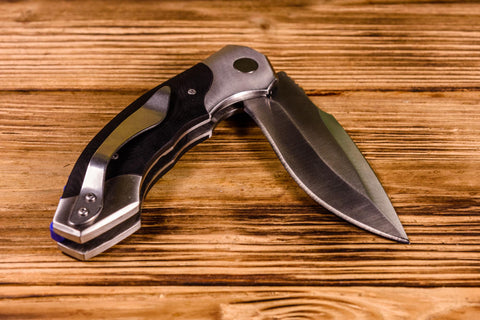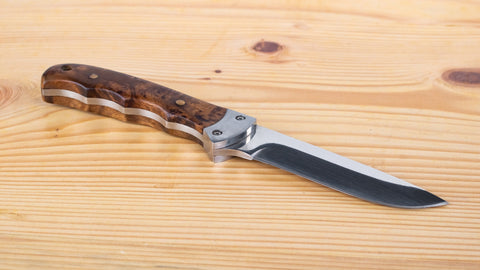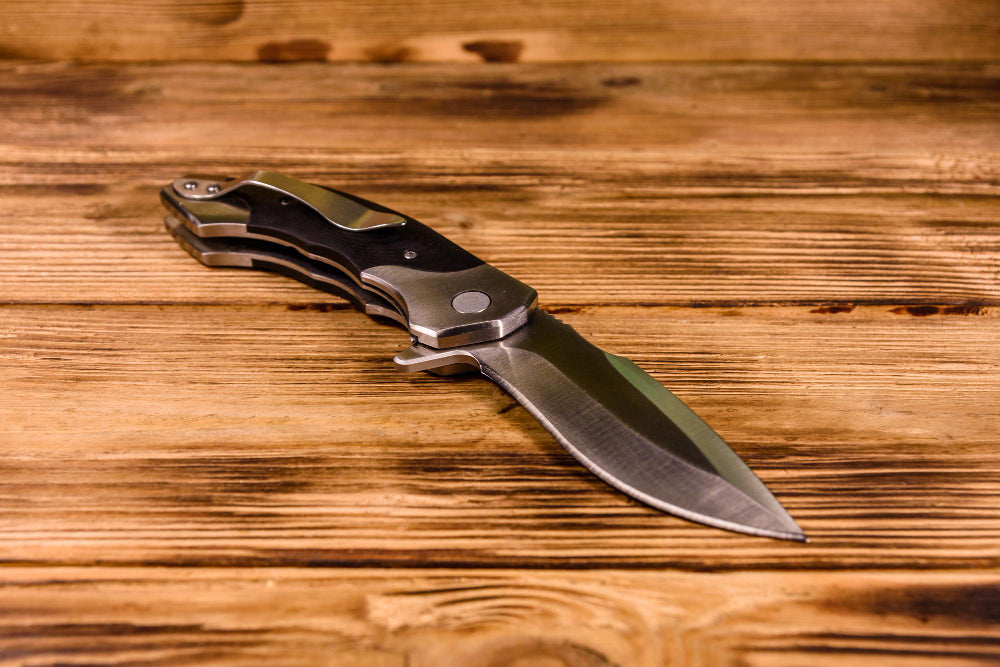What Is A Slipjoint Knife? If you're new to the world of knives, you may be wondering about the different types and styles available. One popular and versatile option is the slipjoint knife.
A slipjoint knife features a blade that doesn't lock but is held in place by a spring mechanism. It's a common design in traditional pocket knives.
In this article, we will explore and define what a slipjoint knife is, giving you a comprehensive understanding of its features and uses.
What Is A Slipjoint Knife?
A slipjoint knife refers to a folding knife without a lock. These knives have been in pockets for decades. They rely on a simple mechanism that uses a spring to keep the blade in the open or closed position. Users appreciate its straightforward, no-fuss design that combines functionality with ease of use.
Common Uses And Applications
The slipjoint knife, a tool praised for its simplicity and reliability, finds its use in myriad daily activities.
Known for its non-locking design, the knife employs a spring mechanism that allows the blade to fold open and closed. This versatility makes the slipjoint knife an essential item in various scenarios.
Everyday Carry (edc) Tool
Slipjoint knives are the perfect size for carrying in your pocket or on a keychain. Their compact nature means they're there when you need them for:
- Opening packages with ease.
- Cutting through tape or ropes without a hassle.
- Trimming loose threads from clothing to maintain a neat appearance.
- Whittling wood to pass the time or for simple carving tasks.
These knives come in handy for countless tasks, making everyday challenges simpler.

Outdoor And Camping Companion
When adventure calls, a slipjoint knife answers. Outdoors, this tool is indispensable for:
| Activity | Use |
| Food Preparation | Chopping ingredients and opening food packages |
| Fire Starting | Shaving tinder and cutting kindling |
| First Aid | Cutting bandages and fashioning slings |
| General Maintenance | Repairing gear and slicing through cordage |
From setting up camp to emergency repairs, the slipjoint knife is a camper's best friend.
Key Features Of Slipjoint Knives
Understanding the key features of slipjoint knives helps in recognizing their unique qualities. These pocket-sized tools have been staples for generations.
Let's dive into their distinctive characteristics.
Non-locking Mechanism
Slipjoint knives feature a non-locking mechanism. Unlike modern tactical knives, they don't lock open. This design allows for easy opening and closing with no lock to disengage. These knives rely on spring tension to stay open or closed. They are safe and legal in many places where locking knives aren't.
Traditional Folding Blade Design
The traditional look of slipjoint knives is timeless. They sport a folding blade design. Often, they come with a single blade, but some have multiple blades for various tasks. Their compact size makes them ideal for everyday carry.
Slippery Joint Functionality
- The term "slipjoint" refers to the knife's action.
- A slipjoint knife's blade opens with a slight "slip" before engaging.
- It holds the blade in place with resistance, not a lock.
| Feature | Slipjoint Knife | Locking Knife |
| Mechanism | Non-Locking | Locking |
| Legal Use | Widely Accepted | Restricted in Some Areas |
| Complexity | Simple | Complex |
In summary, slipjoint knives are defined by a simple yet effective design. They fit seamlessly into daily tasks. Their user-friendly nature makes them a classic choice for many knife enthusiasts.
Advantages Of Slipjoint Knives
The slipjoint knife is a classic tool beloved by outdoor aficionados and everyday users. With no lock mechanism to hold the blade open, it relies on spring tension to stay in place. Despite this simplicity, a slipjoint knife offers several advantages worth considering.
Legal And Compliance Considerations
One core benefit of slipjoint knives is their wide acceptance under knife laws. Because they aren't locking knives, many countries and local jurisdictions allow them for carry.
This makes them great for everyday use across various locations without legal issues. Owners should still check local laws to ensure compliance.
Versatile And Lightweight
Another key advantage lies in their versatility and portability. Often slim and compact, these knives are easy to slip into a pocket or a pack.
They handle a variety of tasks, from cutting string to peeling fruit, making them a practical choice for many situations.
Ease Of Use And Maintenance
Slipjoint knives are known for being user-friendly. They can typically be opened and closed with one hand, and the simple design means fewer parts that can break.
Maintenance is a breeze, generally requiring just basic cleaning and occasional oiling to keep the action smooth.

Proper Care And Maintenance
A slipjoint knife demands regular upkeep for optimal performance. Proper care extends its life and ensures safety. Detailed below are essential maintenance steps.
Cleaning And Lubrication
Keep your slipjoint knife in top condition with these cleaning tips:
- Disassemble with caution, if possible.
- Use a soft brush or compressed air to remove debris.
- Wipe the blade and handle with a damp cloth.
- Avoid harsh chemicals that may damage materials.
- Apply a few drops of knife oil on the pivot point for smooth action.
Sharpening And Honing
Maintain a sharp edge with these sharpening steps:
- Use a whetstone or sharpening tool of choice.
- Hold the blade at the correct angle against the stone.
- Glide the knife's edge in a controlled motion.
- Check the sharpness regularly.
- Finish by honing with a leather strop for ultimate sharpness.
Storing And Carrying
Ensure your knife is safe with these storage tips:
- Avoid moisture and extreme temperatures.
- Use a knife pouch or sheath for protection.
- Store in a dry area.
- Control humidity in storage spaces.
-
Opt for a knife case with soft lining for collection knives.
Conclusion
Understanding slipjoint knives is essential for any enthusiast or professional. These tools offer simplicity and reliability with their classic mechanism. Before choosing one, consider your needs and safety. Embrace the heritage and versatility of the slipjoint knife on your next outdoor adventure or daily task.
Always remember, the right knife can make all the difference.

